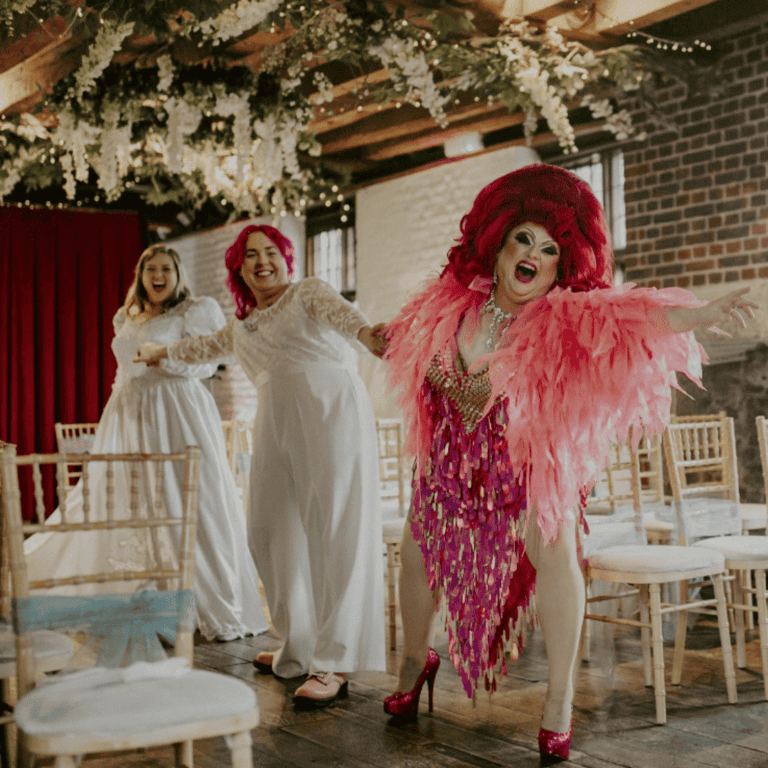Celebrancy is a growing profession in Spain fueled by demand for personalised, non-religious, and interfaith ceremonies, destination weddings and robust ex-pat communities from the UK and beyond.
If you’re considering Training to be an accredited Celebrant in Spain, there are a few things you’ll need to know, so we’ve put together this handy guide to help you and included some case studies from people who’ve actually done it!
What is a Celebrant and what do they do?
Celebrants facilitate meaningful moments in people’s lives; they officiate weddings, funerals, naming days, renewals of vows, and more.
As a wedding celebrant, you’ll meet with couples to get to know them before their big day and help them plan and personalise their ceremony with meaningful ceremony scripts, readings, poems and other suggestions to make their ceremony unique and memorable.
You’ll also lead the ceremony on the day, which might include rituals like handfasting, candle lighting or sand ceremonies.
Read More: What is a Wedding Celebrant and what do they do
Independent funeral celebrant plays several crucial roles in planning and conducting funeral ceremonies. Their responsibilities are focused on creating a personalised and meaningful experience that honours the life of the deceased while providing comfort and support to the bereaved.
A funeral celebrant leads the funeral service, ensuring it flows smoothly and respectfully. This includes introducing speakers, guiding the proceedings, and offering comforting and meaningful words to those who’ve come to pay their respects.
What do Celebrants do in Spain
The role of celebrants in Spain is much the same as that of Celebrants in the UK and rest of the world. They provide unique and meaningful ceremonies for people who want a personalised celebration, whether they are getting married, renewing their vows, planning a funeral for a loved one or celebrating the arrival of a child.
Independent Celebrants in Spain don’t perform legally binding ceremonies, that part is usually taken care of in the local Civil Registry Office (Registro Civil), District Court (Juzgado), or in the town hall where it will be performed by the Mayor or a delegated Councillor (source: Expatica), so they’re not limited by the rules that govern legal marriages.
As an Independent Celebrant in Spain you’re able to perform ceremonies in any location: inside or outside, on a beach, a hillside village, anywhere you want, at any time you want, so if you want to capture the beauty of the sunset (and escape the midday heat) with an early evening ceremony, you can!
Whether you’re bi-lingual or English-speaking, you’ll find plenty of opportunities as a Celebrant in Spain serving local and ex-pat communities as well as the destination/tourist market.

Understanding the Types of Celebrants and Ceremonies in Spain
If you want to become an accredited Celebrant in Spain, there are different types of Celebrants and ceremonies that you can conduct. Some people choose to specialise in one-type i.e. Weddings or Funerals, whereas others who want more flexibility and variety will opt to train in 2 or even all 3 areas of celebrancy.
Wedding Celebrants in Spain
Wedding celebrants specialize in designing bespoke nuptials aligned with a couple’s personality and vision. They have expertise in crafting interfaith or non-religious ceremonies. Unlike Civil Ceremonies carried out at the Civil Registry Office, District Court, or town hall, Independent Celebrants can carry out ceremonies on any day of the week and include spiritual and religious references from any and all faiths – or lead a non-religious ceremony.
You’ll be joining couples on their romantic journey into committed married life, and creating beautifully personal and emotional ceremonies that can include cultural and symbolic elements.
Funeral Celebrants in Spain
Funeral celebrants focus on memorializing a loved one through a unique life celebration. They assist families with funeral planning and provide specialized support throughout bereavement. Independent Funeral celebrants can conduct non-religious ceremonies as a compassionate alternative to religious ceremonies, but unlike civic employees or Humanist Celebrants, they have the freedom to include religious or spiritual aspects.
Naming Celebrants in Spain
Naming ceremonies offer a non-religious alternative to celebrating a child’s introduction to the community. They focus on the child’s individuality and the parents’ hopes for their future. Naming Celebrants can also craft interfaith naming ceremonies that combine aspects from different religions, cultures, and beliefs.
Naming celebrants plan and facilitate ceremonies welcoming babies, adoptions, transitions, and cultural rites of passage. They aim to reflect family heritage and values. Naming days retain meaning across one’s life.
How do I become an accredited Celebrant in Spain?
Becoming an accredited celebrant requires thorough training and adherence to standards of excellence set by celebrancy associations. Accreditation ensures celebrants develop the skills and knowledge needed to craft ceremonies that meet the needs of the individuals, families and communities that you serve, whether they’re Spanish, ex-pats or Brits enjoying a destination wedding.
Before you can work your creative magic and deliver unforgettable ceremonies, you’ll need to train to become a Celebrant with a course provider that offers the best learning option for you.
As an independent certified Celebrant in Spain, you can choose to work in Spain and the Spanish Islands or split your time between Spain and the UK. A qualification from The Academy of Modern Celebrancy is recognised globally, and our team have direct experience of being a Celebrant in Spain, so they can help you navigate your journey.
While you can train in the old-fashioned way – by attending a classroom-based in-person or residential Celebrancy course – Online Celebrant training is the easiest and quickest route to gaining accreditation, business know-how, and the confidence to create memories through ceremonies.
Plus if you train online with an internationally recognised training provider like The Academy of Modern Celebrancy, not only can you access your training flexibly, at a time and place that suits you, but everything is taught in English as well.
Online training to be a Celebrant in Spain
If you live in Spain, Online Celebrant training can give you access to global training talent and complete flexibility to fit your training around your schedule. Online celebrant training offers a flexible & accessible way to learn and train to be a Celebrant. The best online celebrant training courses are structured so you can work at your own pace from the comfort of your home anywhere in the world.
Online training usually involves having access to online modules covering various aspects of celebrancy, including ceremony planning, legal considerations, and creating personalized ceremonies for weddings, funerals, and other occasions.
Trainees engage with interactive content, assignments, and possibly live sessions, allowing for flexibility around personal schedules. Support from tutors and a community of fellow trainees enhances the learning experience. For a deeper understanding of how our Online Celebrant training is structured and what it entails, you can explore more details on the Academy of Modern Celebrancy’s course enrolment and course selection pages.
Read our students’ success stories

Becoming a Celebrant in Spain – Step by Step
The steps to becoming an accredited celebrant include:
- Decide your celebrant focus – wedding, funeral, or naming – or become a master celebrant and go for all three!
- Find an accredited celebrant training program that suits your needs
- Complete coursework and assignments and take assessments in ceremony planning and delivery
- Officiate ceremonies under supervision
- Gaining your celebrant credentials and accreditation
- Pursue ongoing professional development through courses and events
Of course, if you want the easiest route to becoming an accredited celebrant in Spain, check out our Master Celebrant Course.
Certificated Celebrant Training vs Accredited Celebrant Training
Certificated Celebrant Training typically provides a certificate upon completion, indicating mastery of the course content. On the other hand, Accredited Celebrant Training is recognized by an official accrediting body, in our case, NOCN National Open College Network and Ofqual, ensuring the training meets certain standards and criteria.
The key difference between certificated and accredited training lies in the level of external validation and recognition each type of training offers, with accreditation generally seen as a higher standard due to its formal endorsement by a professional body.
Read More: Celebrant Training – A Complete Guide
How long does it take to become a Celebrant in Spain?
While some in-person residential Celebrant Training can be completed in less than a week, we wouldn’t recommend starting your career that way; that’s a lot of information to take on in a short period and most people prefer to have more support as they learn. The more favoured online celebrant training courses, like ours, typically span 4-12 weeks, offering up to a year for completion.
Some students can complete the course and coursework in as little as 4 weeks, but you can take as long as you want or need.
The best AMC online Celebrant training course is structured to provide full support and 1-2-1 mentoring throughout your learning experience. On average, it takes students just 4 weeks to complete the course and achieve accreditation.
How much does it cost to become a Celebrant in Spain?
The cost of becoming a Celebrant in Spain depends on the training course provider you choose. Residential training usually starts around €5000-6000 and you’ll need to factor in travel costs and day-to-day expenses. If you train online, you can expect to pay upwards of €1600 to train as a celebrant for weddings or funerals.
Master celebrancy training that combines Weddings, Funeral and naming celebrancy is usually around €3500.
Once you’re an accredited Celebrant in Spain, the sky is the limit in terms of your earning potential. Independent Wedding celebrants generally charge anywhere between €600 – €1800 per wedding ceremony, Funeral Celebrants typically charge between €350 – €600 for a funeral ceremony and Naming Celebrants charge similar fees between €300 – €700
Spanish Celebrant Case Study: Jennifer Claire Constant

Jennifer Constant, the Director of The Academy of Modern Celebrancy knows a thing or two about becoming a Celebrant, and she also worked as a Celebrant in Spain for many years, officiating weddings for couples. Originally from the UK, Jen and her husband share a love of travel and adventure and Jen’s career as a celebrant perfectly supported that, allowing her to work in both the UK and Spain.
Watch Jen’s Day in the life of a Wedding Celebrant video diary
Being a Celebrant in Spain meant that I got to travel to and work in some of the most beautiful wedding locations across Spain. Because of the flexibility of the work, I got to take my family along and enjoy exploring these incredible places—and get paid to do it!
I’m lucky that I have a supportive husband. He looks after the kids while I’m working, so we can travel as a family and experience these adventures together.
Spanish Celebrant Case Study 2: Sophie Li
English teacher Sophie Li has a private language school in Cadiz. She discovered the possibility of becoming a Celebrant in Spain after having her own celebrant-led wedding.
Becoming a Celebrant has enabled Sophie to work more flexibly and enjoy a better worklife balance, as she was able to reduce the hours she works in her business as a teacher. It’s also given her the flexibility to travel with her family.
As a teacher, Sophie admits to being picky about the courses she takes, but she found the online distance learning offered by The Academy of Modern Celebrancy allowed her to fit her training around her work and family commitments and she was able to train as a celebrant in just a couple of months.
Interested in Celebrant Training?
If you’re ready to change your life with a new career direction. Find out more about our online training for Celebrants in Spain, and all over the world.
Jennifer Claire
Jennifer is the Director of the leading celebrant training company, The Academy of Modern Celebrancy as well as the Founder of The Celebrant Directory, supporting over 600 celebrants globally.
Jennifer run a 2.5k community of celebrants who she dedicates her time to helping them grow their businesses and taking celebrancy from a hobby to a lifestyle.
Jennifer heads up the global Celebrant Industry Awards and the global celebrant summit, Celebrantopia each year!
A celebrant herself since 2010, she knows what it takes to make it in the industry and trains the best celebrants out there across the UK, Europe and the USA.
Take the Quiz to find out if you have what it takes!
Download the Ultimate Guide to becoming a Celebrant & find out how you can make this happen!

If you liked this article you may enjoy ...
8 reasons to niche as a Celebrant + how to do it
Niching as a celebrant can offer several distinct advantages, allowing you to specialize in specific types of ceremonies or cater to particular cultural or community groups. Here are 8 reasons we think you should niche as celebrant: 1. Establish Expertise: Specializing in a particular type of ceremony, like traditional pagan handfasting ceremonies, allows you to…
5 Essential Skills for Celebrants
Have you ever dreamt of officiating life’s most cherished moments – the joyous vows of a wedding ceremony, the heartwarming welcome of a newborn child, or the dignified farewell of a loved one? Celebrants play a crucial role in weaving these threads of life into meaningful experiences. But what exactly does it take to become…
Wedding Celebrant Outfits: 2024 Style Guide
As a wedding celebrant, you’re not just officiating a ceremony; you’re contributing to the overall atmosphere of the special day. While the focus is naturally on the couple, your attire plays a role in setting the tone and ensuring you look professional and polished. And in 2024, we’re throwing the rulebook out of the window!…
As featured in










